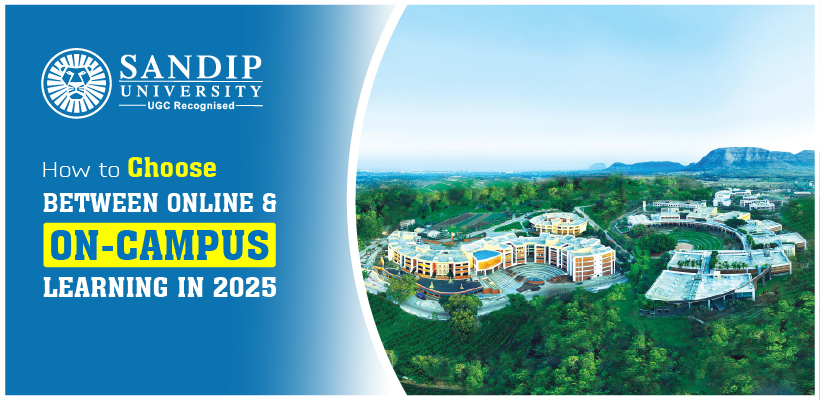The debate over online vs on-campus learning in 2025 has gained steam now. Over the last few years, virtual or online learning has become a popular method of gaining relevant educational qualifications and expertise. The COVID pandemic led to a sudden shift from on-campus to online learning, which showed the world that there is scope for virtual learning platforms as well. Students learnt that they can access courses at universities in other nations without actually being present on-campus. Best learnt that they can attract top meritorious students from around the world to their campus virtually.
However, just like on-campus learning, even online learning has its set of challenges. The Currently in 2025, many students are contemplating the benefits and challenges of both modes of learning and often get confused about which mode to pick. Let us take a look at what exactly online and on-campus learning is all about, the benefits and challenges in both modes of learning, and the future of online education in India:
What is Online Learning?
Online learning is the method of pursuing certification and degree programs by attending classes in a virtual space without actually attending a college campus. Online education has become very popular since COVID as it has removed barriers like accessibility and excessive cost of investment in education. Many colleges offer degrees, short certification courses, seminars, workshops, and more through the online learning medium. Learning material and modules are shared with students beforehand, and they have to submit projects, assignments, and appear for exams virtually.
Benefits of Online Learning
- A flexible schedule helps students manage multiple activities like work, hobbies, and other responsibilities without having to block a large chunk of their schedule for educational purposes
- Students can build on self-discipline and self-motivation as they have to manage a regular schedule to keep up with the virtual mode of education
- Building a wider global network is possible as students from all over the world access such online learning programs so you can interact with other bright minds from around the world without leaving the comfort of your home
- The cost of investment is drastically reduced whether you apply to local or international universities as you can save on visa, accommodation, travel and other such expenses
- Additionally, the tuition fee of online learning programs is significantly more affordable, making them very accessible to students from all economic backgrounds
Challenges of Online Learning
- Online learning lacks face-to-face interaction with professors and fellow students, making it an isolating experience in the long run
- Self-motivation and self-discipline may not work for some students as lack of mandatory attendance can make students lax about attending classes
- Conducting practical sessions are a challenge, especially for technical programs like engineering, which can hamper the overall learning experience
- Lack of access to campus facilities and infrastructure can put a dent in the overall college experience which is a rite of passage for a well-rounded educational journey
- Constant access to broadband and a working laptop has to be maintained to access online classes, which can be a challenge in some remote areas
What is On-campus Learning?
On-campus learning is basically the traditional tried and tested method of learning where students have to attend classes on-campus on a regular basis. Students interact with professors and other students face-to-face in a physical location. On-campus learning has been the most popular means of education for quite some time. Students aspire to study in leading universities and access their campus facilities in a competitive and wholesome manner.
Benefits of On-campus Learning
- On-campus learning is a structured, disciplined, and well-maintained system designed to facilitate student development in a wholesome manner
- Access to college campus infrastructure including labs, libraries, classrooms, etc. can help students learn practical skills and knowledge easily and efficiently
- The opportunity to network and build connections is another positive aspect of the college experience with on-campus learning
- It teaches independence to students, especially to those opting for hostel accommodation as students have to learn life skills that will serve them well in the long run
- Student-teacher interactions happen in real-time where students can solve doubts, ask questions, and gain guidance from experienced professors
Challenges of On-campus Learning
- On-campus learning can be quite expensive, especially if international universities are involved, which can be a financial strain on students
- Lack of flexibility can be an issue for students who want to work while studying and simultaneously have other responsibilities
- Culture shock and homesickness are by-products of staying on-campus and away from home, which can be difficult for some students to handle
- Travelling to and from campus can be time consuming, which could put additional burden on students to manage limited time well
- Constant scrutiny on-campus and the need to maintain strict discipline is the norm for on-campus learning which needs long-term commitment from students
Conclusion
These are some of the top insights about online and on-campus learning. While colleges have now become quite flexible in the kind of degree courses they offer to students, some of the best engineering courses in Nashik after 12th are best pursued through on-campus learning. Both sides of the spectrum have their benefits and challenges, it is vital to take a good look at these aspects of online and on-campus learning before making a final decision about which mode of learning that best suits your needs. Good luck!

